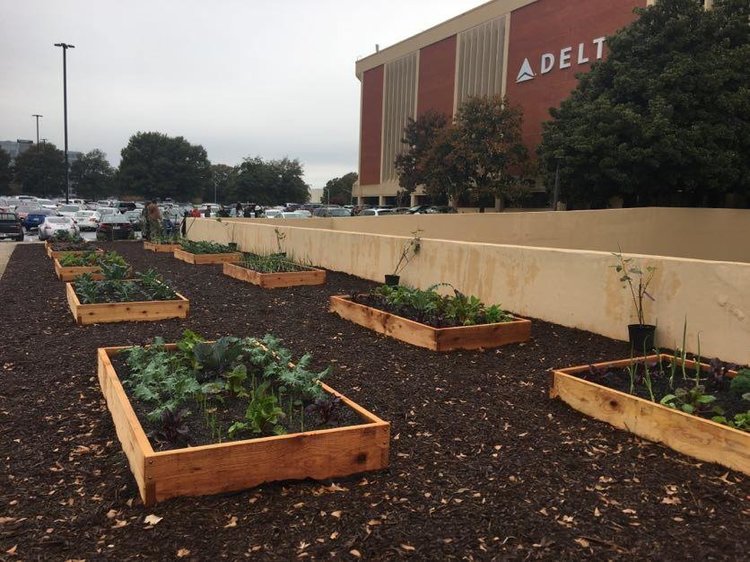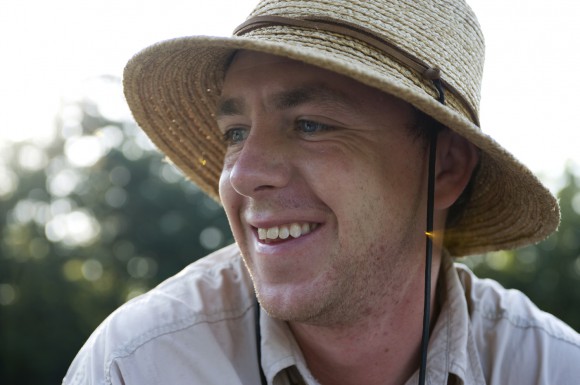
Humans have been tied to food since the beginning of mankind. Through food, humans developed agriculture, which eventually led to advanced society. From an evolutionary perspective, we are tied into the rhythms of food seasonality through generations and generations of ancestry.
Today, humans have developed the mass production of food through agriculture, and we even have the technology to change food on a molecular level. However, these advancements in technology and agriculture have caused detrimental effects on the environment, and people are more removed from the environments where their food comes from than ever before. Kids today are more likely to think carrots grow on trees, whereas at the start of the century, kids knew carrots grew in the ground.
To change this, we must create sustainable and educational solutions, which is exactly what UWG alumnus Cory Mosser did with his company Natural Born Tillers (NBT). The company is introducing an innovative farming approach to landscaping in Atlanta by taking spaces that are underutilized and transforming them into edible, sustainable gardens.
“We go into corporate locations and look at what’s around, and we try to squeeze in fun food experiences,” said Mosser. “We use the gardens as little outdoor classrooms, and we provide the service of maintenance because the last thing you want to do when you’re at work is to go outside and do more work.”

Mosser was a farmer for 10 years before he started the business, which gave him the necessary insight to start NBT. The company only hires experienced farmers that can bring a knowledgeable perspective to edible landscaping. With experienced farmers strategically planning out the food gardens, people are more likely to understand their food sources.
“If you are walking into a garden and see something you understand, you are much more likely to engage with it,” said Mosser. “The more we are separated from what feeds us, the less autonomy we have and the less ability we have to control our food sources.”
NBT works with multiple corporate locations including Delta, Adult Swim Studios and EpiCity Real Estate Services, with Delta being their largest site. The Delta location has raised vegetable beds, peaches, figs, a blueberry patch, a muscadine orchard and even a large pollinator garden. There are multiple volunteer events and harvests that keep the employees engaged with their food sources and the seasons of food production.
The Adult Swim Studios garden is right on Williams Street and even has sculptures of characters from the popular Adult Swim show “Rick and Morty.” The garden also has muscadines growing up a brick wall, plus sunflowers and herbs.
All the sustainable landscaping sights give employees a nice place to enjoy nature, which is proven to boost mental health. According to a 2015 study by Stanford University, individuals who walked in a natural setting for 90 minutes as opposed to an urban setting showed decreased brain activity in a region of the brain associated with depression. Also, in a previous study by the same university, time in nature had a positive effect on mood and cognitive function, including working memory and a dampening effect on anxiety.
“The more you are in nature, the better your mental health is,” said Mosser.
In addition to the positive psychological impact of edible landscaping, there is also a positive environmental impact.
“All of the spaces that we curate we manage organically,” said Mosser. “So there is the added benefit of increasing biodiversity.”
Essentially, through NBT’s projects, the team creates new biological niches in areas that were once lifeless, both aesthetically and literally. This is a refreshing new approach to farming as traditional agriculture methods contribute to a lot of environmental destruction.
“For people that are interested in agriculture, the real challenge is thinking outside the box,” said Mosser. “We need to think about how to maintain the emotional and psychological importance of food because agriculture can be a huge solution but can also be a huge problem.”
Oftentimes, modern agriculture involves destroying a natural ecosystem and growing mass amounts of food in its place. Livestock agriculture is even more inefficient because it takes a lot of resources to feed animals and only a fraction of those resources are gained back. This is not sustainable living and initiates loss of biodiversity, land and water degradation and deforestation. With food knowledge, we are armed with the resources to improve the situation of our planet.
“We’re helping bees, beneficial insects, predatory insects and butterflies, all of which help our gardens,” said Mosser. “It wasn’t until we started creating a surplus through organizational agriculture that advanced civil societies began to develop. Food is the foundation of our society.”
You may also like
-
UWG Students represent at the 2025 AMA International Collegiate Conference in New Orleans
-
Italian Poet Shares His Love Of America Through Poetry at UWG Poetry Reading
-
Ingram Library Works to Find Balance Between Physical and Digital Resources in a World so Dependent on Technology
-
UWG Welcomes Alum Brian Nunez as Keynote Speaker for 41st Annual MAP Awards
-
UWG’s Student Activities Council Hosts the Spring Festival of Colors, Celebrating Culture and Community